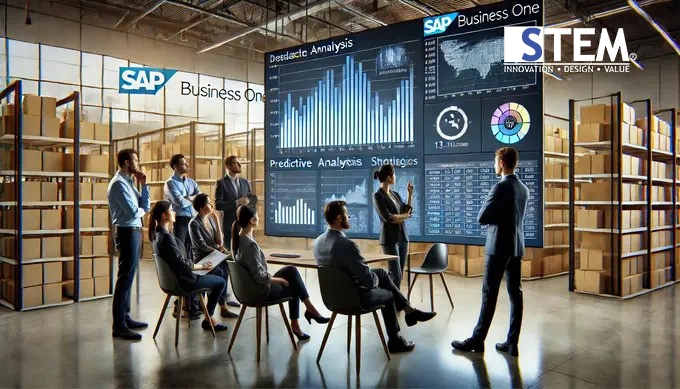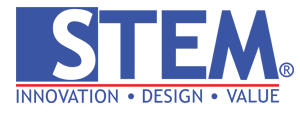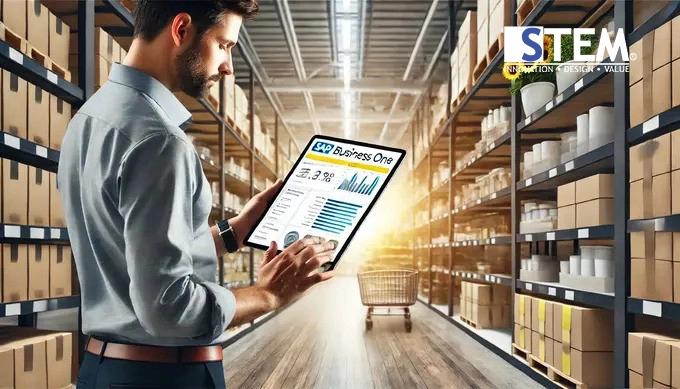The retail industry faces substantial challenges in meeting customer demands, managing inventory, and optimizing sales swiftly and efficiently.
Given the intense competition, the retail sector requires a technological solution that unifies all operational processes within a single platform. SAP Business One emerges as a purpose-built solution designed to help retail businesses handle various aspects of their operations.
SAP Business One for the retail industry not only assists in managing inventory and finances but also integrates CRM capabilities for customer management and data analysis.
Through integration with POS (Point of Sale) applications like iREAP POS, SAP Business One enables retailers to monitor sales across all outlets in real-time, providing the flexibility necessary to remain competitive.
Why is SAP Business One Highly Relevant to the Retail Industry?
SAP Business One is a popular ERP system for small and medium-sized businesses, including those in retail. Here are several reasons why this solution is well-suited for the retail industry:
1. Inventory and Logistics Management
SAP Business One provides comprehensive inventory management, allowing retail businesses to accurately track stock levels, identify popular items, and ensure product availability for customers.
2. Enhanced Customer Experience Through CRM
With CRM integration, SAP Business One allows retailers to track customer interactions, understand preferences, and provide more personalized service.
This customer data can be utilized for more effective promotions and to foster loyalty.
3. Process Automation for Efficiency
SAP Business One reduces manual tasks through automation, making operational processes faster and more efficient.
With automation, store staff can focus more on customer service and sales.
4. Data Reporting for Informed Decision-Making
With SAP Business One, management can access real-time, in-depth data for analyzing sales, purchase patterns, and product performance. This allows for more informed decision-making based on the latest data.
5. Integration with POS Solutions Like iREAP
SAP Business One’s ability to integrate with iREAP POS developed by Sterling Tulus Cemerlang adds substantial value.
iREAP POS supports sales record-keeping and simplifies transaction analysis across business outlets.
Key Features of SAP Business One for the Retail Industry
SAP Business One is equipped with various features that enable retailers to manage operations more effectively. Here are some standout features relevant to retail businesses:
1. Integrated Inventory Management
SAP Business One allows retailers to easily manage stock across branches, monitor inventory in real-time, and optimize product distribution.
Retailers can easily identify out-of-stock items, determine restocking times, and manage the supply chain to ensure product availability for customers.
2. Integration with iREAP POS by Sterling Tulus Cemerlang
iREAP POS enables retailers to track sales transactions at each branch, create sales reports, and analyze customer purchase patterns.
Through integration with SAP Business One, all transaction data from iREAP POS can automatically transfer to the ERP system, enabling more comprehensive analysis and more accurate financial reporting.
3. Customer Relationship Management (CRM)
SAP Business One enables retailers to store customer information, track purchase history, and identify customer preferences.
With this data, businesses can design more personalized marketing campaigns and optimize the customer experience.
4. In-Depth Reporting and Data Analysis
In retail, understanding sales trends and customer behavior is crucial. SAP Business One provides accessible reports and data analysis that can be tailored to business needs.
Retailers can view top-selling products, conduct periodic analyses, and plan promotions based on existing trends.
5. Centralized Financial and Accounting Management
SAP Business One supports integrated accounting and financial management, from transaction recording to financial reporting and budget management.
This feature helps retail businesses monitor finances more effectively and ensures that all transactions are accurately recorded.

Benefits of SAP Business One for Retail Businesses
Implementing SAP Business One offers significant benefits for the retail industry:
1. Improved Operational Efficiency
With integrated features, SAP Business One helps retailers save time in stock management, sales monitoring, and reporting processes. This makes operations more efficient, allowing businesses to focus on growth strategies.
2. Enhanced Customer Experience
Customer data managed through SAP Business One helps retailers deliver more personalized service.
With robust CRM, businesses can understand customer needs, improve the shopping experience, and build closer relationships with customers.
3. Data-Driven Decision-Making Support
SAP Business One provides accurate reports that enable retailers to make better business decisions based on actual data.
Management can determine which products require increased stock, optimal sales strategies, and more effective marketing campaigns.
4. Strengthened Financial Oversight
With an integrated financial system, SAP Business One assists retail businesses in monitoring cash flow, managing financial reports, and ensuring financial health.
This grants businesses full control over their finances and ensures compliance with relevant regulations.
Successful Implementation Tips for SAP Business One in the Retail Industry
To maximize SAP Business One’s potential in the retail sector, consider these implementation tips:
1. Choose an Experienced Implementation Partner
ERP implementation requires a partner skilled in understanding business needs.
Collaborating with solution providers like Sterling Tulus Cemerlang, who understand the intricacies of the retail industry and offer iREAP POS, will help ensure a smooth implementation process.
2. Conduct Training for User Teams
Ensure that all team members who will use SAP Business One receive adequate training. Familiarizing them with essential features enables optimal use of the system.
3. Tailor SAP Business One Features to Your Business Needs
SAP Business One offers various features that can be adapted to the specific needs of retail businesses. Identify your business’s unique requirements so that only relevant features are activated and maximally utilized.
4. Regularly Monitor Performance and Conduct Evaluations
After SAP Business One is running, conduct regular evaluations to monitor system performance. Identify areas that require adjustments to ensure the system continues to support the business optimally.
Conclusion
SAP Business One offers a complete solution for the retail industry, aiming to optimize operations and deliver a better customer experience.
With standout features like inventory management, iREAP POS integration, and integrated customer relationship management, SAP Business One empowers retail businesses to operate more efficiently and respond to market demands.
Partnering with experienced providers like Sterling Tulus Cemerlang can ensure a tailored, effective implementation for your retail needs.
By leveraging SAP Business One, retail businesses can enhance operational efficiency, elevate customer satisfaction, and strengthen their competitive standing in the market.
SAP Business One is an excellent choice for retailers looking to expand their business and provide exceptional service to their customers.


